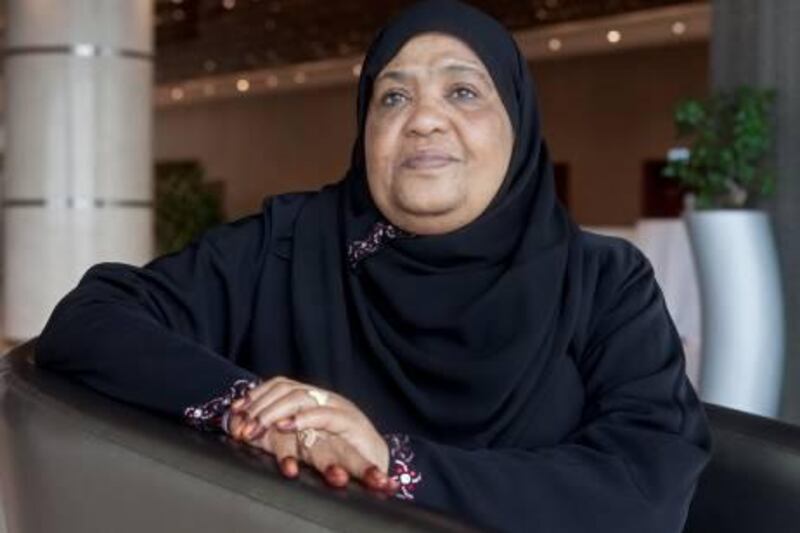DUBAI // Having been honoured at the opening ceremony of the Gulf Film Festival, veteran Emirati actress Mariam Sultan is now about to embark on her most important role to date.
Sultan, known locally as the mother of Emirati theatre artists, was given an award for her contribution to the Arab film and television industry and has now been tasked with archiving the UAE's entire theatrical work.
Sultan, a Sharjah resident, has worked in the industry for more than four decades and is one of the founding members of the Sharjah National Theatre.
"It's an honour to be recognised," she said. "It's also a responsibility because I have to work even harder."
Her first acclaimed role on stage was in the 1976 theatre production Haroon Al Rashid. "It was not easy to be an actress in my day," she said. "Things are different now, but there are still a few issues to combat."
Since Haroon Al Rashid, she has acted in numerous plays, television and radio series and the short film The Key, by Ahmad Al Zain.
"I want to thank young Arab filmmakers for including me in their projects," she said. "I've learnt to teach them and learn from them, too."
This year, the acclaimed actress will tackle what is arguably her biggest role to date.
The Ministry of Culture, Youth and Community Development has asked her to take the lead on a project to collect, archive and preserve the UAE's legacy of theatrical work.
She describes her task of theatrical preservation as "crucial" because drama is part of the essence of UAE culture.
"This is for the next generation," she said.
"The ministry has scripts, press clippings, photographs and recordings of the plays - old and new - so we want to collect them to create an archive that visitors and students can refer to."
One young filmmaker already inspired by Sultan's work is 22-year-old Fatima Musharbek. "I feel warm whenever I see her because she is an inspiration," she said.
Musharbek's documentary, Rabbit Hole, has been entered into the Student Documentary Short Competition at GFF. The 22-minute documentary examines the influence of mass media on Emirati teenagers and their identity.
"I explored how teenagers are copying celebrities like Tom Cruise and Justin Bieber and how, along the way, they have somehow lost their own identity. They are copying the way they dress and their attitude," said Musharbek.
"I believe everyone should have their own individual personality stemming from their culture and environment, but I do not force my ideals onto the audience." During filming, she approached fellow female students about their vision of beauty, and found it was often clouded by the images on glossy magazine covers.
"I showed magazine photos of celebrities and them without make-up because everyone knows no one is perfect. It's all an illusion," she said.
Fellow aspiring filmmaker Maysoon Al Ali is also competing in the Student Documentary Short Competition. Her 10-minute film, Nation and Tribes, focuses on integration between different religions in the Emirates - or the lack thereof. "It is a poetic documentary with no words," said the 21-year-old. "I went inside temples and churches for the first time to try and understand other religions that live among us.
"It was a challenge because they were a little reserved to allow me in the Hindu temple, for example, at first."
The documentary follows the rituals that take place between sunrise and sunset, profiling the various nationalities one can come across in a day.
"I learnt to have a better connection with others," she said of her filming experience.
The results of the GFF Student Documentary Short Competition are scheduled to be announced on Wednesday.






